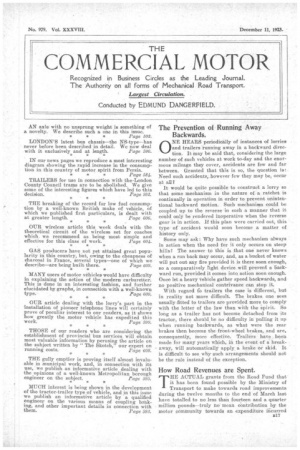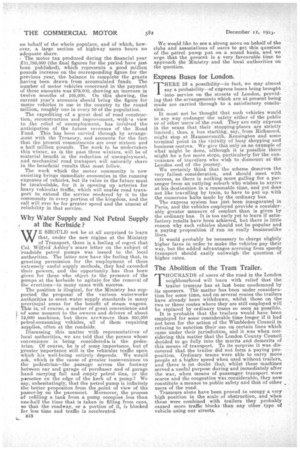The Prevention of Running Away . Backwards.
Page 1

Page 2

If you've noticed an error in this article please click here to report it so we can fix it.
ONE HEARS periodically of instances of lorries and trailers running away in a backward direction. It may be said that, considering the large number of such vehicles at work to-day and the enormous mileage they cover, accidents are few and far between. Granted that this is so, the question is Need such accidents, however few they may be, occur at all? It would be quite possible to construct a lorry so that some mechanism in the nature of a ratchet is continually in operation in order to prevent unintentional backward Motion. Such mechanism could be coupled up to the reverse in such a manner that it could only be rendered inoperative when the reverse gear is in action. If this plan were carried out, this type of accident would soon become a matter of history only. . Some may ask: Why have such mechanism always in action when the need for it only occurs on steep hills? The answer to this is that one never knows when a run back may occur, and, as a bucket of water will put out any fire provided it is there soon enough, so a comparatively Tight device will prevent a backward run, provided it comes into action soon enough. Once let a heavy Vehicle gather speed backwards, and no positive mechanical contrivance can stop it. With regard io trailers the case is different, but in reality not more difficult. The brakes one sees usually.fitted to trailers are provided more to comply with the letter of the law than withthe spirit. So long as a trailer has not become detached from its tractor, there should be no difficulty in pulling it up when running backwards, as what were the rear brakes then become the front-wheel brakes,. and are, consequently, more effective. Trailers have been made for many years which, in the event of a breakaway, will automatically apply a brake or skid. It is difficult to see why such arrangements should not be the rule instead of the exception.
How Road Revenues are Spent.
THE ACTUAL grants from the Road Fund that it has been found possible by the Ministry of Transport to make towards road improvements during the twelve months to the end of March last have totalled to no less than fourteen and a quarter million pounds—truly nomean contribution by the motor community towards an expenditure incurred on behalf of the whole populace, and of which, however, a large section of highway users bears no adequate share.
! The motor tax produced during the financial year £11,750,000 (the final figures for the period have just been published), which represents a good million pounds increase on the corresponding figure for the previous year, the balance to completethe grants having been drawn from accumulated funds. The number of motor vehicles concerned in the payment of these amounts was 979,000, showing an increase in twelve months of 105,000. On this showing, the current year's accounts should bring the figure for motor vehicles in use in the country to the round million, roughly one in every 50 of the population. The expediting of a great deal of road construction, reconstruction and improvement, witloa view to the relief of unemployment, has involved the anticipation of the future revenues of the .Road Fund. This has been carried through by arrangement with the Treasury, and accounts for the fact that the present commitments are over sixteen and a half million pounds. The work to be undertaken this winter, as in the past three winters, will be of material benefit in the reduction of unemployment, and mechanical road transport will naturally share in the beneficial results that must follow.
The work which the motor community is now assisting brings immediate economies in the running expenses of vehicles, but its value in the future must be incalculable, for it is opening up arteries for heavy vehicular traffic, which will enable road transport to extend the service rendered by it to the community to every portion of the kingdom, and the call will ever be for greater speed and the utmost of reliability in that service.
Why Water Supply and Not Petrol Supply
i at the Kerbside ? .
WE SHOULD not be at all surprised to learn that, under the new regime at the Ministry of Transport, there is a feeling of regret that Col. Wilfrid Ashley's scare letter on the subject of 'roadside petrol pumps was issued to the local authorities. The latter now have the feeling that, in granting permission for the employment of these extxemely useful supply methods, they had exceeded their powers, and the opportunity has thus been given for those who object to the presence of the pumps at the kerbside to agitate for the removal of the erections--in many cases with success.
The position is illogical, for the Ministry has supported the proposal of the various waterworks authorities to erect water supply standards in many provinaial areas for the benefit of steam wagons. This is, of course, a matter of great convenience and
Iof some moment to the owners and drivers of about ! 12,000 machines, but there area, more than 960,000 petrol-consuming vehicles, all of them requiring supplies, often at the roadside.
Discussing this matter with representatives of . local authorities, we are told that the person whose . convenience is being consideredu is the pedestrian. Of course, he is of some importance, but of greater importance still is the -vehicular traffic upon which his well-being entirely depends. We would ask, :Which is the cause of greater inconvenience to the pedestrian—the .passage across the footway between car and garage of purchaser and of garage hand carrying full and empty petrol tins, or the peesence on the edge of the kerb of a pump? We say, unhesitatingly, that the petrol pump is infinitely the better propositon from the point of view of the passer-by on the pavement. Moreover: the process of refilling a tank from a pump occupies less than one-half the time that is taken in filling from cans, so that the roadway, or a portion of it, is blocked for less time and traffic is accelerated.
La B18 We would like to see a strong move on behalf of the clubs and associations of users to get this question of the petrol pump put on a sound basis, and we urge that the present is a very favourable time to approach the Ministry and the local authorities on the question.
Express Buses for London.
THERE IS a possibility—in fact, we may almost say a probability—of express buses being brought ,intoservice on the streets of London, providing that the arrangements which are at present being made are carried through to a satisfactory conclusion. It must not be thought that such vehicles would in any way endanger the safety either of the public or of other Users of the road. They are only express in the sense that their stopping-places are strictly limited; thus' a bus starting, say, from Richmond. might stop at Hammersmith, Kensington and some terminal point in the vicinity of busy shopping and business centres. We give this only as an example of what might be done, although it is possible there might be a few more stops, particularly for the convenience of travellers who wish to dismount at the London end of the journey.
We certainly think that the scheme deserves the very fullest consideration, and should meet with success, as there is nothing more galling for a passenger from an outlying suburb who wishes to arrive at his destination in a reasonable time, and yet does not like travelling by train, to have to put up with the numerous halts made by the ordinary bus. The express system has just been inaugurated in Paris, and the vehicles employed provide a considerably greater measure of comfort than is given by the ordinary bus. It is too early yet to learn if satisfactory results have been achieved, but there is little reason why such vehicles should not be popular and a paying proposition if run on really businesslike lines.
It would probably be necessary to charge slightly higher fares in order to make the vehicles pay their way, but the added advantages accruing from speedy transport should easily outweigh the question of higher rates.
The Abolitionof the Train Trailer.
THOU.SANDS of users of the road in the London neighbourhood will learn with relief that the trailer tramcar has at last been condemned by its sponsors. The matter has been under consideration for some time, and on several routes the trailers have already been withdrawn, whilst those on the two or three routes where they are still employed will be replaced by ordinary trams so soon as possible. It is probable that the trailers would have been employed for some considerable time longer if it had not been for the action of the Wimbledon Council in refusing to sanction their use on certain lines which 'came under their jurisdiction, and it was when considering this matter that the London County Council decided to go fully into the merits and demerits of this mea.ns of transport. To its surprise it was discovered that the trailer did not form a paying proposition. Ordinary trams were able to carry more people at a higher speed when used without trailers, and there is nodoubt that; whilst these machines served a useful purpose during and immediately after the war, when means of passenger transport were scarce and the congestion was considerable, they now' constitute a menace to public safety and that of other users of the road.
Tramcars alone have been proved to occupy a very high position in the scale of obstruction, and when these were combined with trailers they probably caused more traffic blocks than any other type of vehicle using our streets.
































